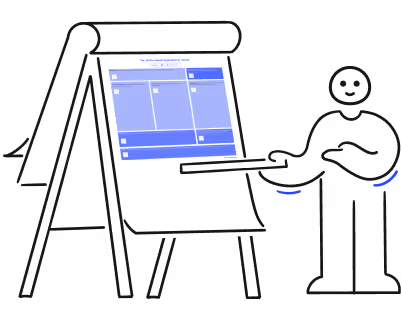A corporate training strategy is not just an HR responsibility

Empower your organization with the skills-based canvas.

When a machine breaks down in a manufacturing company, it gets repaired.
No questions asked!
Equipment maintenance is budgeted because it’s a tool that contributes to efficient operations on the production line. As simple as that.
It's the same thing for software: when you don't have the desired performance, you invest in improving or updating it. Why? Because it’s necessary for the smooth running of your company's activities.
So why is it different when talking about employees?
If your team is not meeting its performance goals, you must invest in updating its knowledge!
The costs associated with developing your staff are directly related to the profitability of your business. But who should manage the corporate training strategy?
1. What is corporate training?
Training provides an individual or a group with the knowledge necessary to carry out an activity.
Corporate training is developing your employees’ skills to perform their tasks. In other words, it's investing so that your staff is more efficient and effective at work.
We are talking about investing in corporate training strategy since the result contributes directly to improving the product and the services offered.
The more you train your employees, the more you ensure your company’s operational and financial success!
Why invest in corporate training?
Earlier, we made the parallel between the machine and the employee.
What makes equipment maintenance and corporate training different?
The money invested in improving a machine is limited to the device itself. If we have 5 machines that break, we will have to spend 5 times more to repair them all.
When you invest in the development of an employee, the result becomes exponential and can improve the performance of your entire staff.
With good practices and the right corporate training strategy, you can:
- speed up the integration of a new resource
- update your employees' knowledge
- improve the skills of low-performing employees
- standardize work methods
- protect organizational memory
The positive effects go beyond operations: well-trained employees will be happier and more loyal to the employer.
Managing corporate training in the company is an important activity that must be prioritized in your next budget forecasts.
2. Who should manage the corporate training strategy?
HR should take care of everything that affects humans, right?
Actually, HR is responsible for guiding the career path of your employees. But the operations team is much more aware of the real needs of frontline workers!
Fortunately, you can segment corporate training into two responsibilities:
- Creating and updating content
- Managing enrollment and progression
Who should manage the corporate training strategy between HR and operations? Why not a bit of both!
The role of operations in corporate training
The operations team oversees production and customer service, constantly exposing them to the field’s challenges.
It is, therefore, the ideal team to recognize corporate training needs.
Since the operations do the production planning, they know the strengths and weaknesses of each of their resources. It's beneficial to develop your employees to the same level, maximizing flexibility in schedules and workloads.
The technical training of employees also aims to increase the productivity and efficiency of operations. Since operations management is constantly aware of business needs, it sees more quickly the area of improvement to be crossed to support the overall objectives better.
This strategic vision of corporate training ensures skills development with a better return on investment in the short term.
Other key benefits of shifting corporate training responsibility to your operations team include:
- Knowledge of the most pressing skills gaps
- Better ability to identify clear and actionable technical needs
- Creation of corporate training more aligned with the reality of the floor
- Quicker content update when the reality changes
- Ability to share the workload of content creation with high performers
The role of HR in corporate training
Since HR is not involved in day-to-day operations, it is better not to impose the burden of content creation.
Fundamentally, the role of HR revolves around the long-term view of the human needs of the organization. By not being exposed to frontline workers, it is difficult to have an accurate understanding of the technical training needs in the company.
By giving the corporate training responsibility to your human resources, you put operations at risk.
However, HR knows better than anyone the best practices in onboarding and career development. With this in mind, they are the best people to support your team managers in developing courses’ syllabuses.
Another great strength of human resources is the communication of the internal culture. Establishing a learning culture that encourages knowledge sharing often seems intangible for operations.
Yet, it is crucial for better skills retention and greater organizational performance!
To facilitate the establishment of this learning culture, the responsibility of HR in corporate training is to:
- Document the proper methods for content creation
- Determine categories and groups on the learning management system
- Track the progress of employees in their learning journey
- Extract completion reports for compliance and financial monitoring
It is a coordination and support role rather than an execution or content creation role.
3. How to organize corporate training in your company?
We determined that operations should be responsible for content creation and that HR should coordinate corporate training activities.
Now, how to organize training in the company so that everyone finds their way around quickly?
Technology is a natural ally for centralizing information and inviting different departments to collaborate. This is the kind of project that we frequently see on Didacte and which shows us that everyone has a role to play in the company!
However, it is not the hammer that builds the house, but the person who uses it.
Before investing in a corporate training project, you should first clarify, detail and divide your internal needs.
To avoid launching yourself into the void without a parachute, our team can help you establish your action plan. Request a demonstration of Didacte to build a winning strategy together and better manage training in your company!
Discover, manage, and grow your team’s skills to unleash their potential and retain your rising stars.












